Bad Jews
By Joshua Harmon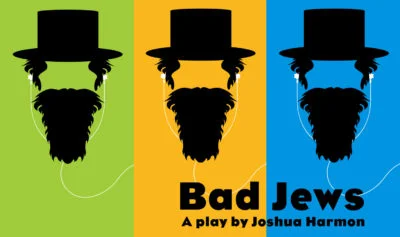
Directed by Jeremy Wechsler
Produced by Theater Wit, Chicago
Future of Judaism Dramatized with Wit
Joshua Harmon’s play Bad Jews, which debuted in New York in 2012, has been causing such a stir that despite its newness I was a little surprised to see it is only now being produced in Chicago. Earlier this season, there were productions in Boston, Philadelphia, and Washington DC, testifying to how vitally relevant theatre managers judge this show to be to one of the demographics most disproportionately interested in theatre. It’s a wise choice, and having just extended Mr. Burns: a Post-Electric Play twice, Theater Wit director Jeremy Wechsler clearly has a strong understanding of what audiences are interested in. Harmon is a young playwright, and Bad Jews displays evidence of that, but under Wechsler’s direction, this play reaches emotional depths beyond the intellectual abstractions that a post-Holocaust-survivor Jewish community is usually discussed through.
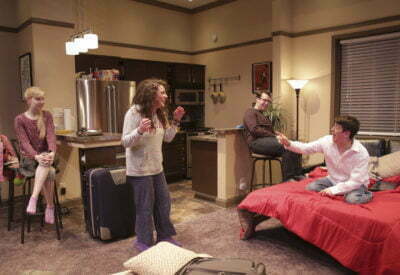
The story takes place in a well-furnished studio apartment with a window in the bathroom facing the Hudson River. It was purchased for two brothers, Liam (Ian Paul Custer) and Jonah (Cory Kahane) by their wealthy parents, so they could all live in the same building together, and there would be more space for guests on special occasions. One of those occasions is today, the funeral of Liam and Jonah’s grandfather, Poppy, and the guest is their cousin, Daphna (Laura Lapidus). This is a problem, because Daphna has a strident personality and is much more interested in Jewish identity than the brothers. So far the conflict hasn’t erupted, because Jonah is meek and passive, and Liam hasn’t shown up yet due to having been on a ski-trip and dropping his iPhone off a lift, but tension is already brewing.
Among all Poppy’s possessions, there is only one Daphna wants: an amulet of the Hebrew word chai, meaning “life,” which he kept hidden under his tongue for years in Nazi concentration camps. The object is of great religious significance, and Daphna argues that since she is the only one of the cousins who believes in the Jewish religion, nobody should object to her having it. Poppy’s will is ambiguous on the matter, and Jonah insists he doesn’t want any involvement. But when Liam shows up, unexpectedly accompanied by his gentile girlfriend Melody (Erica Bittner), he immediately demands Jonah’s help in defending his claim. Though Liam sees no inherent or communal value in the chai, it was the piece of jewelry Poppy used to propose to his wife, and Liam obtained it through his mother to use in proposing to Melody. He hasn’t done that yet, due to the upsetting of his romantic plans by Poppy’s death, and he doesn’t want the moment tainted by association with Daphna.
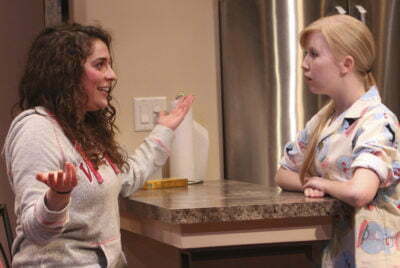
Sure enough, Daphna immediately launches a psychological war against the sheltered, immature Melody, in which she accuses her of defiling her body and complicity in genocide. Liam, already frazzled, retaliates, and Jonah and Melody are left in the middle of a vicious verbal battle. Liam charges that Daphna’s commitment to a group identity is due to her insecurity over her lack of any outstanding qualities as an individual, and her love of Judaism is based on misremembered childhood nostalgia for holiday pastries, rather than genuine admiration for halachic ethics, which are vile. Daphna’s counter is that as someone pursuing a Ph.D. in Japanese studies at the University of Chicago, Liam clearly does recognize something of interest in distinctive cultures, just not ones that affect him personally, he still identifies as Jewish to establish his legitimacy when he bashes Israel, and that he finds Asian and Christian women attractive because their notion of femininity is to behave and think like children.
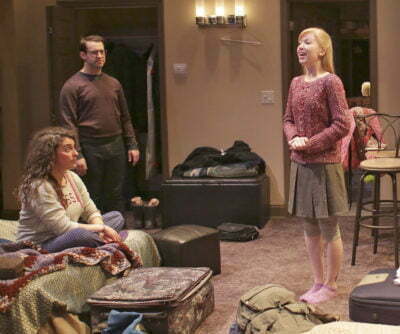
During these arguments, Harmon indulges in letting Liam and Daphna deliver lengthy monologues consisting of both philosophy and personal attacks. While these speeches risk becoming tedious, Lapidus and Custer are fine enough actors to pull them off with flourish, and at the performance I saw, the audience spontaneously applauded one of Liam’s tirades. Wechsler wisely directed Lapidus and Kahane to take their time with the first few minutes of the play, which allows us to see Daphna in a more loving attitude. Though a fierce opponent, Daphna is deeply vulnerable, and Lapidus keeps her needs near the surface at all times. Liam is older and described by the script as having “as much of a sense of humor as an overdue library book.” Custer plays him as clever, but cold and supremely disdainful. The moments of physical affection Wechsler arranged between the two brothers are unbelievable, though that could be Liam’s awkwardness, since his attitude toward Melody is also paternalistic.
Jonah and Melody are often cowed into silence, but still provide Kahane and Bittner with memorable moments. Jonah is easily flummoxed and not very bright, but Kahane plays him with great patience and a compassionate desire for peace, above all. Bittner has the most comedic role as Melody, who majored in opera, and abandoned that dream after two auditions, which Daphna finds hilarious. Her rendition of George Gershwin’s Summertime brought tears of laughter to the audience’s eyes, and will more than make up for any anxiety older Jews may feel over the subject matter. However, like Jonah, she has a basic belief that all people deserve respect, only she’s more willing to assert it.
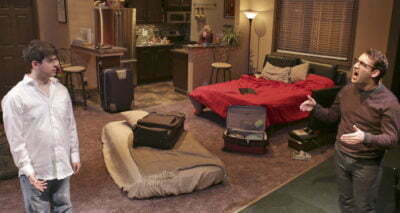
Daphna describes Melody’s wardrobe as looking like she “was live water-birthed in a Talbots,” which costume designer Janice Pytel takes to heart. The most interesting design element is Daphna’s horrible hair, which has attracted plenty of attention in every production as both a spectacle and for its symbolic value. Theater Wit even has a small display in the lobby of how other actors in the role have deliberately mangled their manes. It’s a small, but to me, very sad moment when she attempts to brush it while dry, winds up ripping out chunks of it that float around in the air until settling on peoples’ clothes, and earns a scolding from Liam and banishment to the bathroom. As a person with Jew-hair, I recognized she was taking care of it all wrong, and was a little stung when Liam used her appearance as evidence of her inferiority to Melody. I wonder how much of Daphna’s insecurity comes from, despite her affinity for Jewish life, just not knowing that the brush is not her friend.
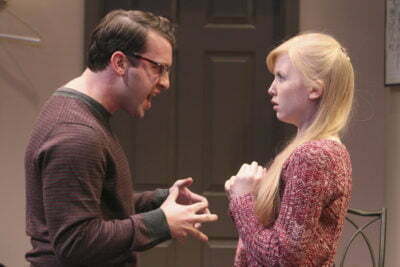
At one point, Liam challenges the value of the conversation, and implicitly, the entire play, by comparing it to late-night undergraduate dorm room babbling. It’s true that to what extent Jewish culture ought to be preserved isn’t really a new debate in the non-Orthodox denominations, although it’s a little unusual to see such a public clash of two such opposed viewpoints. Harmon wrote his dialogue with realistic “umms” and cut-off sentences, and he also labors to make his characters go on and offstage when he wants them to, which Wechsler can only do so much to compensate for. However, at the performance I saw, the audience hung onto every word. By making the funeral of a Holocaust survivor his instigating event, Harmon drove straight to the heart of the anxiety so many Jewish people feel over loyalty to their tribe. Of course, every ethnic group in America has been through similar conversations over assimilation, albeit not always in the shadow of a genocide. Should non-Jews be interested in attending, I imagine they’ll find the experience worthwhile. For Jews, it can feel like rehashing the same old argument, but the drama over the chai adds a level that will ensure it sticks around in your mind for a long time.
Highly Recommended
Jacob Davis
[email protected]
Reviewed May 10, 2015
This play has been Jeff recommended.
For more information, see Bad Jews’ page on Theatre in Chicago.
Playing at Theater Wit, 1229 W Belmont Ave, Chicago. Tickets are $20-36; to order, call 773-975-8150 or visit TheaterWit.org. Plays Thursdays through Saturdays at 8:00 pm except May 14, and Sunday at 2:00 pm through June 7. Running time is one hundred minutes with no intermission.
